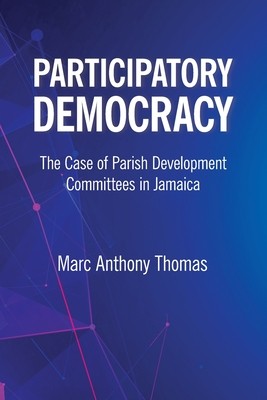
- We will send in 10–14 business days.
- Author: Marc Anthony Thomas
- Publisher: University of the West Indies Press
- ISBN-10: 9766408548
- ISBN-13: 9789766408541
- Format: 15.2 x 22.9 x 1.1 cm, minkšti viršeliai
- Language: English
- SAVE -10% with code: EXTRA
Reviews
Description
In
Participatory Democracy: The
Case of Parish Development Committees in Jamaica, Marc Anthony
Thomas expands the existing knowledge on participatory democracy. Parish development
committees were established as a means for Jamaicans to inform government
policy, and Thomas explores the extent to which supportive institutional, infrastructural
and superstructural conditions allow for robust implementation of this
democratization initiative. His analysis is bolstered by an appreciation of the
emancipatory politics employed by the country's general population since
slavery not only to survive oppression, but also to influence the nation's
political agenda. Riots during slavery and in the present day, for example,
have offered citizens an avenue towards self-determination.
development committees promotes inclusiveness yet is led predominantly by
older, educated middle-class individuals with talents and capacities garnered
from several years of experience in various fields. Thomas argues that the
opportunity cost of a more inclusive order explains this fact, in that
Jamaica's finite resources mean there is limited space for a learning curve and
the cash-strapped committees have only been able to survive when their members
could help to defray the cost of their operations.
By observing more than one hundred hours of
parish development committee activities and interviewing sixty key informants
and four focus groups, Thomas finds that the emergence, survival and thriving
of parish development committees in Jamaica is determined largely by the extent
to which emancipatory political tactics are successfully applied by committee stakeholders
to combat a number of continuing challenges. His analysis provides a
micro-scale view of the interaction of factors that have shaped the power and
possibility of Jamaica's democratization initiative.
EXTRA 10 % discount with code: EXTRA
The promotion ends in 23d.02:44:34
The discount code is valid when purchasing from 10 €. Discounts do not stack.
- Author: Marc Anthony Thomas
- Publisher: University of the West Indies Press
- ISBN-10: 9766408548
- ISBN-13: 9789766408541
- Format: 15.2 x 22.9 x 1.1 cm, minkšti viršeliai
- Language: English English
In
Participatory Democracy: The
Case of Parish Development Committees in Jamaica, Marc Anthony
Thomas expands the existing knowledge on participatory democracy. Parish development
committees were established as a means for Jamaicans to inform government
policy, and Thomas explores the extent to which supportive institutional, infrastructural
and superstructural conditions allow for robust implementation of this
democratization initiative. His analysis is bolstered by an appreciation of the
emancipatory politics employed by the country's general population since
slavery not only to survive oppression, but also to influence the nation's
political agenda. Riots during slavery and in the present day, for example,
have offered citizens an avenue towards self-determination.
development committees promotes inclusiveness yet is led predominantly by
older, educated middle-class individuals with talents and capacities garnered
from several years of experience in various fields. Thomas argues that the
opportunity cost of a more inclusive order explains this fact, in that
Jamaica's finite resources mean there is limited space for a learning curve and
the cash-strapped committees have only been able to survive when their members
could help to defray the cost of their operations.
By observing more than one hundred hours of
parish development committee activities and interviewing sixty key informants
and four focus groups, Thomas finds that the emergence, survival and thriving
of parish development committees in Jamaica is determined largely by the extent
to which emancipatory political tactics are successfully applied by committee stakeholders
to combat a number of continuing challenges. His analysis provides a
micro-scale view of the interaction of factors that have shaped the power and
possibility of Jamaica's democratization initiative.


Reviews